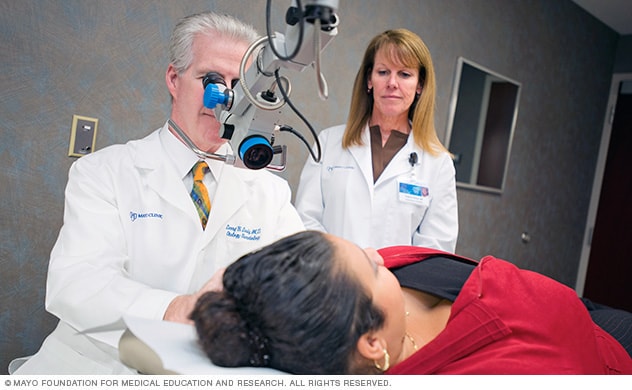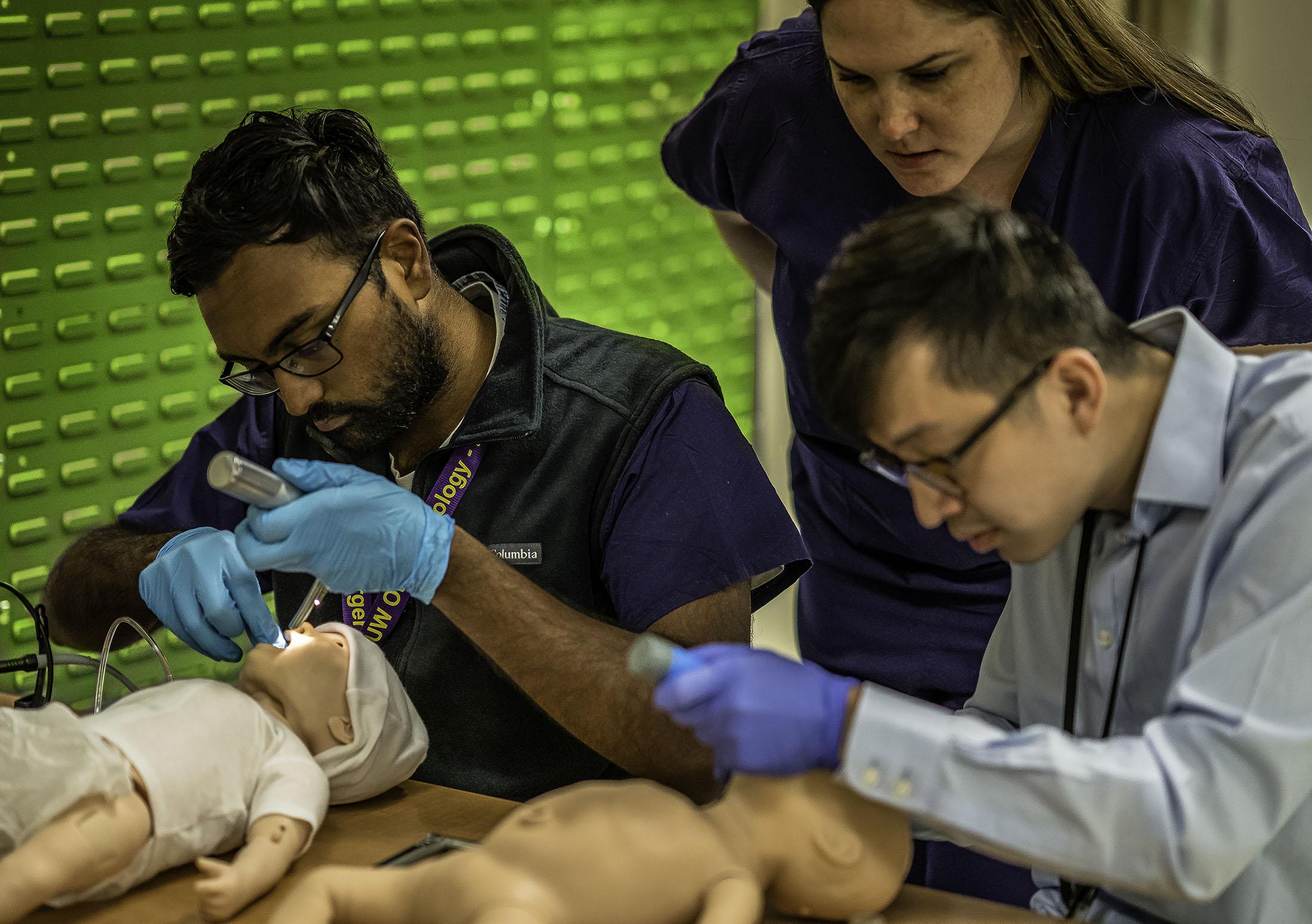When Seeing a Specialist with an Otolaryngologist Can Help Your Health
When Seeing a Specialist with an Otolaryngologist Can Help Your Health
Blog Article
Discovering the Field of Otolaryngology: What to Anticipate When You Get In Touch With an ENT
Otolaryngology, typically referred to as ENT, encompasses the diagnosis and therapy of throat, nose, and ear problems. For those experiencing related issues, consulting an ENT professional can supply clarity and alleviation. Comprehending what to expect throughout such examinations is vital for effective interaction and care. This review will outline vital elements of the ENT experience, including usual reasons for visits and the procedures entailed in diagnosis and treatment.

Recognizing Otolaryngology: A Review
Otolaryngology, often described as ENT (Throat, ear, and nose) medicine, is a specialized branch of medicine that concentrates on the diagnosis and treatment of conditions affecting these important areas of the human body. This field encompasses a large array of conditions, including those associated to hearing, balance, respiratory feature, and speech. Otolaryngologists are educated to take care of both surgical and clinical treatments, utilizing advanced strategies and modern technologies. Their competence extends beyond typical conditions, resolving problems such as allergies, sinus infections, and hearing loss. Additionally, they play a critical duty in the administration of head and neck cancers, giving complete care customized to private patient demands. Generally, otolaryngology stays important for maintaining health and wellness and high quality of life in affected people.
Common Factors to See an ENT Specialist
Numerous people look for the expertise of an ENT expert for a range of factors, reflecting the diverse nature of problems that affect the throat, nose, and ear. Usual concerns consist of persistent sinus problems, which usually leads to consistent nasal blockage and facial discomfort. Allergic reactions and their linked symptoms, such as sneezing and itching, also prompt visits to these specialists (ENT surgery). Hearing loss, whether steady or abrupt, is one more significant reason for assessment. Additionally, individuals may seek evaluation for throat disorders, consisting of persistent hoarseness or swallowing troubles. Sleep apnea, identified by disturbed breathing during sleep, is often resolved by ENT experts. Each of these conditions highlights the significance of specialized treatment in handling complex ENT-related wellness problems
Getting ready for Your ENT Appointment
When planning for an ENT visit, it is important to gather appropriate info and consider any type of certain worries. Clients should assemble a thorough clinical history, including previous ear, nose, or throat problems, surgeries, and present medications. Recording signs-- such as frequency, duration, and extent-- can give beneficial insights for the ENT professional. Additionally, people should prepare a checklist of concerns they desire to ask, making certain that all worries are addressed throughout the go to. Bringing along any type of appropriate medical records or examination outcomes can even more help the ENT in recognizing the client's problem. Individuals need to confirm their appointment details, including area, time, and day, to decrease any last-minute confusion. Proper preparation can enhance the performance of the assessment and result in much better results.
What to Expect During the Consultation
As the consultation starts, the individual can expect to engage in a complete conversation with the ENT expert about their symptoms and clinical background. The expert will make inquiries about the duration, frequency, and seriousness of signs such as hearing loss, nasal blockage, or aching throat. Furthermore, the person's previous clinical conditions, medications, and any relevant family members history will be evaluated, helping the expert in forming a total understanding of the individual's wellness. The ENT may also ask about way of living aspects, such as exposure to toxic irritants or allergens. This open discussion establishes a structure for the appointment, making sure that the client's concerns are addressed and establishing the phase for any type of necessary evaluations or referrals for therapy.
Diagnostic Examinations and Procedures in Otolaryngology
A variety of diagnostic tests and treatments are important in otolaryngology to properly examine and diagnose conditions affecting the nose, throat, and ear. Common examinations include audiometry, which measures hearing feature, and tympanometry, examining middle ear stress. Nasal endoscopy enables visualization of the nasal passages and sinuses, while laryngoscopy takes a look at the throat and vocal cords. Imaging strategies, such as CT scans and MRIs, give comprehensive views of head and neck frameworks. Allergic reaction testing may additionally be conducted to determine triggers for sinus or respiratory concerns. These analysis devices enable ENT experts to establish a complete understanding of patients' conditions, making sure customized and reliable monitoring plans. Proper diagnosis is necessary for effective therapy end results in otolaryngology.
Treatment Options Offered by ENT Specialists
ENT specialists provide a range of therapy choices customized to attend to details problems influencing the ear, nose, and throat. These treatments range from conventional methods, such as medicine and way of life adjustments, to more invasive treatments. For example, allergic reactions might be taken click for more care of with antihistamines or immunotherapy, while persistent sinus problems could call for nasal corticosteroids or sinus surgical treatment. For hearing loss, ENT specialists typically suggest listening devices or surgical treatments like cochlear implants. In situations of throat problems, alternatives can consist of speech treatment or procedures to get rid of obstructions. Additionally, they might supply support for handling sleep apnea, including using CPAP tools or surgical interventions. On the whole, the goal is to improve patients' high quality of life via personalized care and reliable therapy techniques.
When to Look For Follow-Up Care With an ENT
Identifying when to look for follow-up care with an ENT specialist is important for taking care of continuous signs or issues associated with nose, throat, and ear problems. Patients must take into consideration his comment is here arranging a follow-up appointment if signs continue despite preliminary therapy, such as chronic ear discomfort, nasal congestion, or throat pain. Changes in hearing, equilibrium problems, or unusual nasal discharge may additionally necessitate additional examination. Furthermore, if a client experiences negative effects from prescribed medicines or has undertaken a surgical procedure, follow-up treatment is very important to monitor recovery and deal with any issues. Prompt appointments can ensure effective administration of conditions, avoid possible difficulties, and provide comfort concerning one's health and wellness. Seeking follow-up care promotes proactive health and wellness administration in otolaryngology.
Often Asked Concerns

What Certifications Should I Look for in an ENT Professional?
When seeking an ENT expert, one need to seek board accreditation, pertinent experience, and strong individual reviews. Additionally, effective communication abilities and a compassionate technique can considerably enhance the total treatment experience.
Just how Do I Choose the Right ENT for My Requirements?
Picking the best ENT professional entails assessing their credentials, experience, and patient evaluations (ENT Doctor). It is vital to consider their interaction design and approach to treatment, guaranteeing they straighten with the individual's particular wellness needs and preferences
Are There Any Type Of Risks Connected With ENT Procedures?
The threats connected with ENT treatments might consist of infection, blood loss, anesthesia difficulties, and possible damage to bordering structures. Clients must review these threats with their physician to understand individual issues and guarantee informed decisions.
How Can I Manage Anxiousness Prior To My ENT Consultation?
To handle stress and anxiety prior to a visit, individuals can practice deep breathing exercises, visualize favorable end results, prepare concerns in breakthrough, and look for assistance from friends or family, fostering a sense of confidence and peace.
What Should I Do if I Experience Negative Effects From Treatment?
If adverse effects from treatment occur, the person needs to without delay report them to their you can check here medical care copyright. Modifications to treatment or added treatments may be necessary to assure security and efficiency in handling their condition - Hearing. As the consultation begins, the client can expect to involve in a complete discussion with the ENT professional concerning their signs and medical background. These diagnostic tools enable ENT professionals to create an extensive understanding of people' problems, making certain tailored and effective administration strategies. ENT professionals offer a selection of therapy choices customized to resolve particular conditions affecting the nose, ear, and throat. When seeking an ENT specialist, one must look for board accreditation, appropriate experience, and solid person testimonials. Picking the ideal ENT professional involves reviewing their certifications, experience, and patient testimonials
Report this page